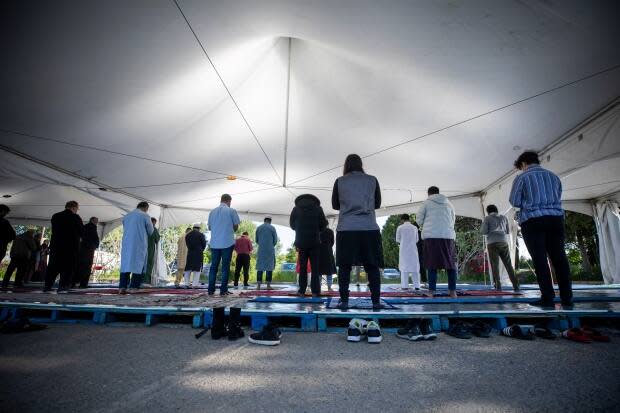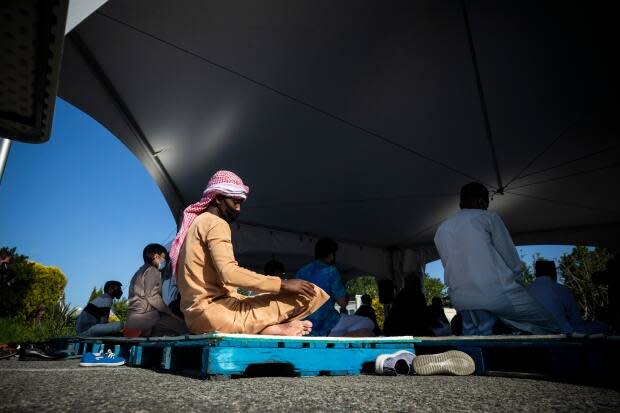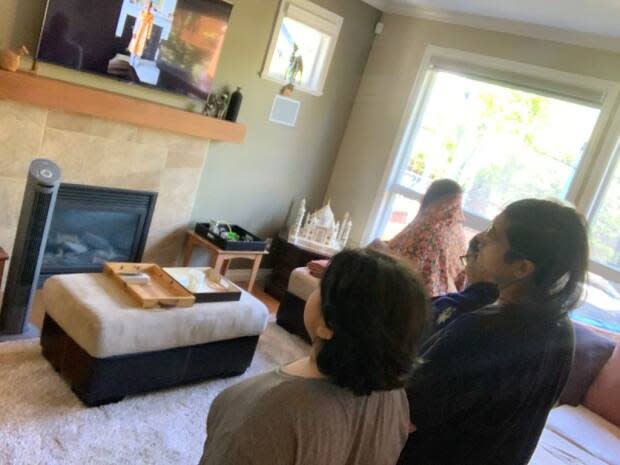Muslims find ways to pray together — but apart — during second Eid Al-Fitr under COVID restrictions

Whether praying on a wooden plank in a parking lot or virtually online, Muslims across the globe have had to find unique ways to celebrate Eid al-Fitr in the midst of COVID-19 for a second year in a row.
The celebration, which marks the end of Ramadan, the Muslim month of fasting, is usually done in close quarters with thousands standing shoulder to shoulder. But, in a time where distance is key and large gatherings are banned, communities have had to find new ways.
Eid al-Fitr, which means the festival of breaking the fast, marks the end of the holy month of Ramadan.
It is a month in the Muslim calendar when community members who are willing and able go without food and water from sunrise to sunset; sometimes lasting 15 to 16 hours a day. They fast for spiritual gain as well as to understand sacrifice and what it means to not have food and water.
The end of the holy month is marked with the celebration of Eid al-Fitr, where a group prayer is recited in the morning followed by celebrations and meals with friends and family.

Taking a unique approach
Kaisan Merali, 11, learned the prayer, also known as the Eid namaz, to recite in the Jamatkhana, Ismaili Muslim place of prayer, but for two years in a row he's had no Jamatkhana to recite in.
His father, Karim Merali, said if prayers couldn't take place in person, they'd create a new tradition.
"[Kaisan] recited it over Zoom and that's how we got everybody together. We were hoping things would be different this year, but we're still in the same situation," Merali said.
Kaisan said if his grandparents couldn't attend prayers due to pandemic restrictions, he'd bring the prayers to them virtually.

"Due to COVID we came together as a family [virtually] to give back to the community and so that we can spend time together," the 11-year-old said.
For the B.C. Muslim Association, new provincial health guidelines pertaining to outdoor prayers this Eid al-Fitr made it possible to create a slightly different setting than last year.
Yahya Momla, senior Imam with the association, said prayer rotations took place in parking lots and courtyards of masjids and mosques starting as early as 6:30 a.m.
"They are having multiple services with 50 people per service following the provincial health officers orders," Momla said.
But even if the rotations went all day, not every Muslim could be included so many families followed online prayers safely from home.

Shahee Lakhani's family was one of the ones that took part in prayers at home.
"Having an Eid namaz at home together, we have not done that before. So, definitely quite the experience ... listening to the recordings of the prayer [and] participating — just us," Lakhani said.
But she said, as thankful as she was to have the opportunity to celebrate with her family, she hopes to see crowds and festive clothing next year.
"We miss ... the sense of tranquillity. In a congregational setting it's just different, the vibes are different," Lakhani said.
Momla couldn't agree more.
"We do dearly miss standing shoulder to shoulder and praying in congregation," Momla said.
But, whether side-by-side or six feet apart, or even through a screen, the greeting remains the same for all who celebrate the day: Eid Mubarak.

 Yahoo Movies
Yahoo Movies 